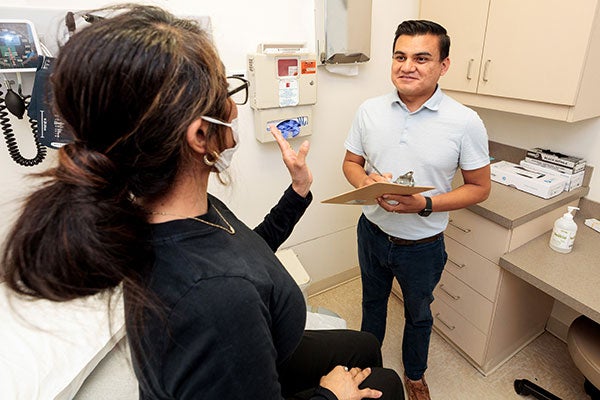ECU finalist for national community engagement award
East Carolina University is one of four national universities recognized for extraordinary community engagement initiatives and named a regional winner of the 2024 W.K. Kellogg Foundation Community Engagement Scholarship Award given by the Engagement Scholarship Consortium.

ECU and its partners provide integrated behavioral health services to about 7,000 people each year in rural North Carolina. (ECU News Services photo)
As a regional winner, ECU will now compete as a finalist for the C. Peter Magrath Community Engagement Scholarship Award given by the Association of Public and Land-grant Universities (APLU). The other finalists are the University of Minnesota, Oregon State University and West Virginia University.
Since 2007, the consortium has partnered with the APLU — with support from the W.K. Kellogg Foundation — to honor the engagement scholarship and partnerships of four-year public universities.
ECU was chosen for its efforts to address high suicide rates and significant unmet mental health needs stemming from economic stressors, geographical isolation, family dynamics and other health challenges facing rural North Carolina residents.
In 2006, ECU launched a partnership with Contentnea Health, based in Snow Hill, to increase access to critical primary health care and behavioral health services for underserved populations.
“The ECU-Contentnea Health partnership shows how university-community engagement acts as a bridge to connect knowledge and innovation, transform lives, foster collaboration and cultivate brighter futures for all,” said Dr. Sharon Paynter, chief innovation and engagement officer and interim chief research officer at ECU.
The partnership has supported more than 126,000 integrated behavioral health care encounters with patients through primary care clinics, dental clinics, on farms and in school settings since its inception over 18 years ago. The effort provides behavioral health services on average to 7,000 people each year.
“ECU’s commitment to rural health for our communities is central to our DNA. It’s who we are as an institution, and we lift up that commitment through our mission,” said ECU Chancellor Philip Rogers.
ECU and its external partners have worked to deliver integrated behavioral health services within primary care visits for rural, underrepresented, and underinsured or uninsured patients and families in eastern North Carolina. The university partnership provides 154 doctoral and master’s students with foundational clinical and research training with lasting impressions on standards of care that frame their careers.

ECU alumnus Dr. Kenneth Phelps is a medical family therapist who received clinical and research training through ECU’s partnership with Contentnea Health. (Contributed photo)
“Every person out there has a real right to be seen for whatever they’re going through — medical, mental health or otherwise — and valued as someone who deserves to be able to access and have care. That’s just a crucial part of being a system caring for people,” said Dr. Kenneth Phelps, medical family therapist and ECU alumnus.
The Magrath Award and the Kellogg Community Engagement Awards recognize universities that have redesigned their learning, discovery and engagement missions to develop deep and enduring mutually beneficial partnerships with their communities. The national award is named for C. Peter Magrath, APLU president from 1992 to 2005.
“Community engagement is a critical part of public universities’ mission, and we’re pleased to highlight the work of institutions that are instrumental to solving the most pressing challenges facing their communities through partnerships with other stakeholders,” said APLU President Mark Becker.
The community engagement awards also have recognized the University of Alaska Fairbanks, University of North Carolina at Charlotte and Purdue University for exemplary projects in community engagement scholarship. The exemplary projects and Magrath Award finalists will be showcased at the Engagement Scholarship Consortium’s annual conference later this year.
The Magrath Award will be announced in November at the APLU annual meeting, North America’s largest convening of public university presidents, provosts, vice presidents and senior administrators. The award includes a sculpture and a $20,000 prize. The three other regional winners will each receive a $5,000 prize to further their work.
